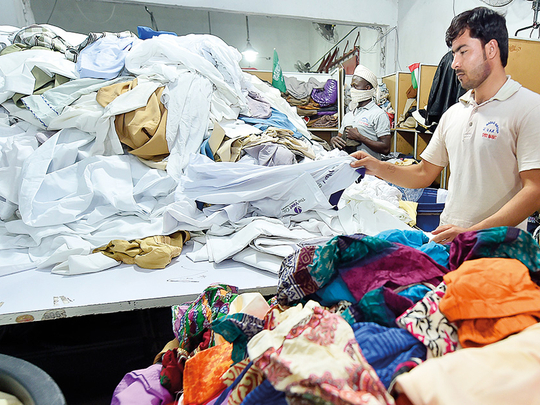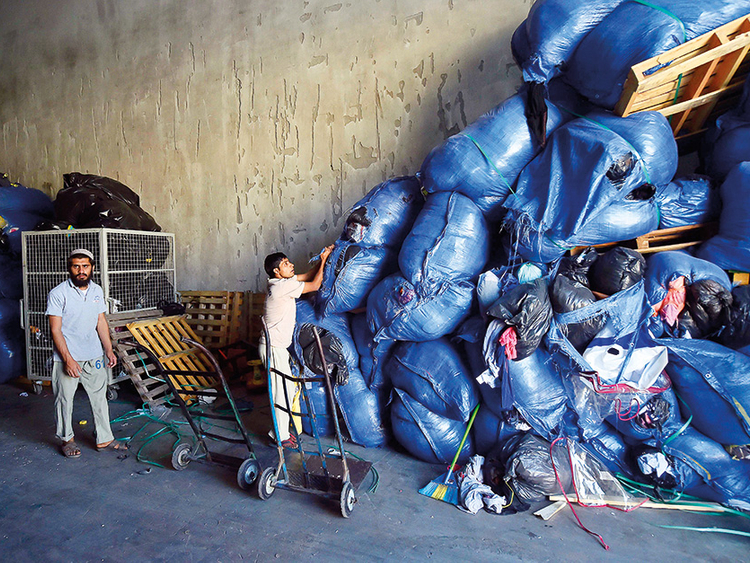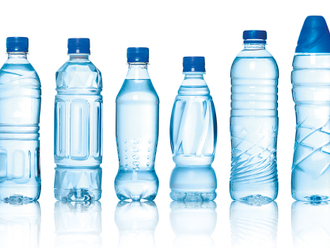
Dubai: Are you the type to wear the same two or three outfits to different parties through the year?
Or are you the kind who ensures you have a new outfit for nearly every party you attend?
In all probability, a majority of people will fall into the latter category. After all, it is the fashion dictum of our age.
As consumerism in fashion expands its footprint, many voices are being raised about its impact — leading among them being UK designer Stella McCartney who joined a campaign by the Ellen MacArthur Foundation.
Wasteful, harmful
It highlights retail fashion industry’s alarming production and consumption rates, which she said have led it to be “incredibly wasteful and harmful to the environment.”
McCartney joined the move started by the environmental campaigner Dame Ellen MacArthur, whose foundation exposed the industry’s scale of waste.
Calling for a systemic change to the way clothing is produced and used, the report pointed out the “throwaway nature of fashion has created a business which creates greenhouse emissions of 1.2bn tons a year — larger than that of international flights and shipping combined.”
It also highlighted that “less than one per cent of material used to make clothing is recycled into new clothing…. And a truckload of clothing is wasted every second across the world.”
MacArthur, who gained the support of industry leaders including the C&A Foundation, H&M, and Nike for her report, is calling for a circular textile economy to be created to make fashion more sustainable.
“We need a new textile economy in which clothes are designed differently, worn longer, and recycled and reused much more often,” added MacArthur.
The report said: “The textiles industry relies mostly on non-renewable resources - 98m tonnes in total per year - including oil to produce synthetic fibres, fertilisers to grow cotton, and chemicals to produce, dye, and finish fibres and textiles.”
Tragic epidemic
Dubai-based fashion designer Ragini Nagu, co-owner and designer at Ragmatazz, describes fast fashion as one of the world’s “most tragic epidemics”.
Nagu, who co-founded a fashion line of handmade tribal and ethnic pieces, endorses the responsibility designers around the world must have towards protecting the environment.
“As someone who works in the industry, we know full well the sad results of this movement and we take responsibility for the products we put out and ensure that our company isn’t selling quantities but quality products that can be worn for generations to come,” said Nagu.
She pointed out that people succumb to social pressures and find the need to buy new clothing for every new event in their life. Many feel embarrassed to be seen in the same clothes more than a few times.
“Buying quality clothing is expensive, so they go for cheaper versions, which lack in quality. Eventually adding to the problem of buying more than you need and having to discard it sooner than usual,” said Nagu.
She referred to this cycle of consuming and discarding clothing as the reason perpetuating the problem with production and consumption rates in the fashion industry.
Cure to a symptom
Addressing the importance of recycling, Nagu said the practice should not be considered a cure to the cause, but as a cure to a symptom.
“With the help of a few YouTube tutorials, anyone can transform an old T-shirt’s or a pair pants into something totally different. This can not only be an interesting way to recycle clothing, but it can also help people develop a healthier relationship with the things they buy,” she said.
Helping people curb unconscious buying patterns will also help them develop more creative approaches to self-expressions, added Nagu.
“The process of over consumption of low quality product due to this mental need to ‘keep up with the jones and follow ever changing trends is what’s causing this huge imbalance in our societies. People need to take on a minimalist approach to fashion and understand the importance of buying quality product that lasts longer instead of supporting the fast fashion movement,” said Nagu.
She described the fast fashion as the movement “that preys on self-esteem” and makes people feel inadequate if they choose not to follow trends.
Discussing her own business, Nagu said she incorporates the ideas of recycling by collecting her own waste fabric in boxes and then using those cut pieces for patchwork in her dresses and jackets. “We also offer our customers the opportunity to repair their clothing with us for a minimal price so they don’t discard them sooner than they should,” she added.
Nagu explained that everything she makes, is made with quality in mind. “The last thing we want to do is cut corners and make product that ends up in a landfill three months after purchase,” she said.
Nagu and her business partner said they choose to take on the extra cost and steps required to make a product that can be passed on like an heirloom.
Consumers speak
Kholoud Kotait, 23, Egyptian
Angie Arumugam, American Business Council, US
Wasif Mahnudoz, Azerbijan
Dura Shabaka, Iraq, Student
Jem Lee, Philipines, works in tourism, Dubai
“I shop twice a month, and that’s usually because I really enjoy it. I do go through my closet every six months and take out clothes I don’t use anymore for recycling. I am not too educated about the harms of the fashion industry on the environment, but if I were to read more, perhaps I will change my shopping habits and be more aware.”
Recycling clothes in the UAE
Dubai: As the recycling movement slowly grows in the UAE, interest in the recycling of clothes is also expanding with hundreds of green charity boxes placed around the country. Gulf News talked to Binu Thankappan, office manager at Al Wadaq Recycling Company located in Hamriyah Free Zone in Sharjah, about the process of recycling clothes.
“We receive around 10,000 tonnes of clothes per month on average from some of the major suppliers from Europe, the US, and some Asian countries. We also receive collections from the UAE,” said Thankappan.
Al Wadaq’s Textile Collection Management Services (TCMS) provide the opportunities for charities and the general public to dispose of more of its used clothing in an environmentally friendly way.
Imported clothes are separated into different categories, by age, size, and type of clothing. Usable items are separated and packed to be exported either for donations or to be resold.
Al Wadaq is one of the largest and fastest growing textiles recycling companies in the world, first launched in Karachi, Pakistan in early 1990s.
The business then expanded to Sharjah Industrial Area in 1999.
The company specialises in the collection, recycling and exporting of used clothing.
It works in partnership with some of Europe’s biggest charities and local authorities and provides strategic recycling and collection solutions for cities, municipalities, communities, shopping centres, retailers, churches and schools.
Through its operation, it diverts millions of pounds of clothing from landfills, generates new revenue streams for businesses and non-profits, and fuels local economies.
It currently exports clothes to over two dozen countries including Jordan, Iraq, Kenya, Congo and South Africa.
The company expanded its operations to other emirates in the UAE, by opening several branches — one in Al Jurf Industrial area, Ajman, and another two in Hamriyah Free Zone, Sharjah.
“These entities are running successfully with currently a total workforce of more than 300 employees,” said Thankappan.
High thread count of compassion
Dubai: The clothes are handmade and go to children in need around the world. The combined efforts of individuals in Dubai’s communities have created around 7,000 children’s garments through a community group called Rags to Riches.
Established over four years ago by British Dubai resident Barbara Evans, it quickly gained momentum after a group was formed on social media. The group invited community members who could sew, help recycle fabrics and make garments for children.
Community members donated fabrics, bed linen, unwanted dress fabrics among many types of cloth, which were then used to make garments including dresses, washable nappies for babies, shirts and shorts for boys, and blankets, pencil cases, tote bags and string bags.
The donation also helped create sanitary kits for girls around the world. “[Many] have absolutely nothing. The kits include items that are made out of cotton and are 100 per cent natural, fully washable and reusable,” said Evans.
The diversity of Rags to Riches also takes into account the weather in the regions the clothes are sent to.
“I provide volunteers with patterns if they ask, while others make their own patterns,” said Evans. This helps the dresses acquire a variety of styles and colours.
The garments were shipped to 23 countries over four years, including the Philippines, Ethiopia, India, Africa, Kurdistan refugee camps and Syrian refugee camps in 2017.
Evans said the initiative does not accept monetary donations. “I was doing it on my own for two years when I felt I needed to open it up and offer a chance for others to participate.”
The response was strong.
In 2017, a team of 20 women — both stay-at-home mums and working mothers — regularly contributed to the initiative by sewing garments at home. “The number of regular helpers has increased to 30 over the Christmas and New Year period — it’s nice to see so many people interested in helping,” said Evans.
This year, the group aims to begin their first project of the year by making garments for 600 orphans in Kenya, ranging from newborns to 21-year-olds.
Sarah Webster, UK, Dubai resident
“I joined Rags to Riches as soon as I arrived in Dubai in January 2017. I read an article about the group in Gulf News and I was looking for volunteering work at the time. I love to sew, so when it mentioned that it combines sewing and doing something good for a cause, I contacted the group and got some patterns. I have been sewing clothes, pencil cases, hoodies and other items all year for the group. The end result is great — to see a smile on the faces of children who don’t have anything.”
Bibiana Pereira, Indian, Dubai resident
“I heard about Rags to Riches through Facebook. I lived in Nairobi for six years from 2009 to 2015, and was involved in helping many charities. After moving to Dubai, I was in search of something to fill this void. I am a quilter and love to sew.
“I have three kids and it occurred to me that the interest in sewing needs to be revived in the younger generation. I also realised that there aren’t many service opportunities for teenagers in Dubai. So I thought of R2R for teens.
“I spoke to Barbara and she wholeheartedly supported the idea. And that is how I contributed to R2R in a way that worked for me too. As I drive and am on the road a lot, I also help R2R by picking and dropping stuff around the city when it is needed.”









